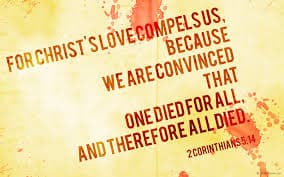In light all that we have learned today in the Antioch church’s love towards the church in Judea from Acts 11:29, it’s helpful to ask: At what point does our love for others cease; in other words what are the barriers that we refuse to cross in order to love? Is it when we realize that we will not get any or enough reciprocity or recognition for our love? Is it when we determine that another person has mistreated us to such an extent that they have actually disqualified themselves from receiving our love?
In comparison, let’s consider the extent to which God has loved us, been generous to us and met our needs. John wrote about Christ in John 13:1 Now before the Feast of the Passover, when Jesus knew that his hour had come to depart out of this world to the Father, having loved his own who were in the world, he loved them to the end or to the uttermost. [meaning he was about to meet their greatest need at the highest cost to himself; the giving up of his own body unto death].
Then Paul goes on to teach in Rom. 8:32 He who did not spare his own Son but gave him up for us all, how will he not also with him graciously give us all things? In the context, it’s things which bring about eternal security and our final redemption, but the argument would mean nothing if the Father not sparing his Son did not represent the most certain and extension act of sacrificial imaginable. Because he has gone as far as needed in expressing his generosity, Christians can have certainty of their eternal existence. This unfathomable expression of love towards sinners is what we fellowship in with in each other and with the Triune God (John 17).

